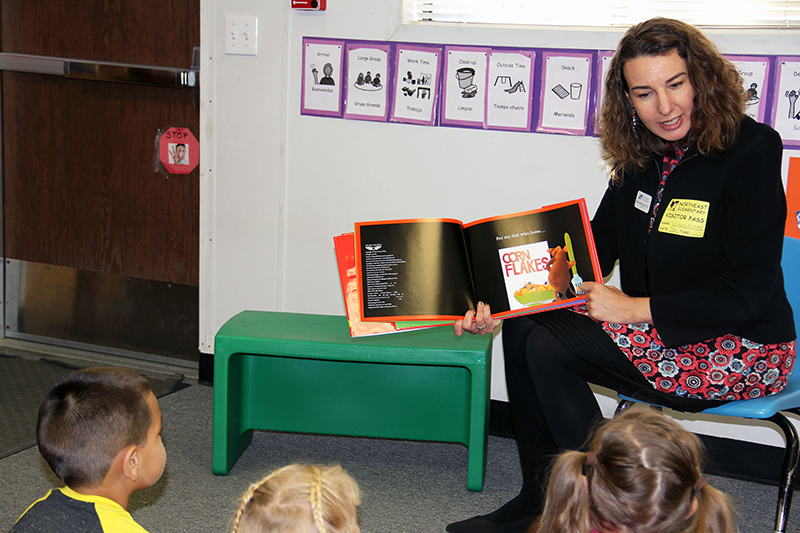You are here
Colorado READ Act Information for Parents
News
CDE launches campaign on importance of reading to children at home
To increase awareness of the importance of early literacy, the Colorado Department of Education launched a public information campaign to encourage and empower parents to make reading part of their daily routine with their children.
Coming Soon!
Parent Resources
READ Act Video - English:
READ Act Video - Español:
About the Colorado READ Act
The Colorado Reading to Ensure Academic Development Act (Colorado READ Act) was passed by the Colorado legislature in 2012, giving the state the guiding philosophy, structure and resources to get children reading at grade level by the time they enter the fourth grade.
Colorado's Commitment to Early Literacy
The ability to read is perhaps the most important skill we can teach in school.
The READ Act creates a system to identify students experiencing challenges with reading, to engage parents in the development of reading improvement plans and to provide quality support for those most at risk.
By challenging our state to move more students toward grade-level proficiency in reading, we believe collectively we can increase overall student achievement here in Colorado. Early student success is a roadmap to everyone's future success. It all begins with reading.
Past Commissioner Katy Anthes
Key Facts About the Importance of Early Literacy
- Graduation, college and career preparedness are more likely possibilities for students who master reading skills by fourth grade.
- Reading to learn enables a student to comprehend facts in social studies and science, understand word problems in math and interpret increasingly complex concepts in language arts.
- A student who misses the opportunity to learn to read proficiently before fourth grade almost never catches up.
- According to the Annie. E. Casey Foundation, students who cannot read by the end of third grade are four times more likely to drop out of high school, and high school drop outs make up 75 percent of citizens receiving food stamps and 90 percent of the Americans on welfare.
How to Support Reading at Home

- Be an Advocate: Keep informed about your child's progress in reading. Ask the teacher about ways to help.
- Talk Often: The more words children hear, the better they will be at reading. Narrate your day. Talk about everything you and your child do throughout the day. Converse with your child over meal times and other times you are together. Introduce new and interesting words.
- Read Together: Read books together, spend time talking about the stories, pictures and words. Listen to audiobooks. Ask your child questions about the content. What was the subject, what did they like or not like about the book?
- Be an Example: Children learn from the habits of those around them. Read, write, listen to audiobooks and show your child the benefits of both.
- Visit the Library: Story times, special events, books, magazines, computer access, homework help and other exciting opportunities and activities await the entire family at your local library.
Talking to your Child's Teacher About Reading Progress
- If your child is At Level/On Target: If your child gets this designation from their school, it means your child is on track for meeting reading targets. You will want to ask your child's teacher about daily reading instruction. What does classroom instruction look like? What skills are they working on? What home activities can support instruction?
- If your child is At Some Risk: If your child gets this designation from their school, it means he or she has some reading skills but not all of them. Supplemental supports are needed in addition to grade-level instruction to help get your child on track. You will want to ask your child's teacher about supplemental supports. What does classroom instruction look like? What skills are they working on? What skills should my child need to have supported? What types of home activities can support instruction?
- If your child is At High Risk: If your child gets this designation from their school, it means he or she has limited or no reading skills. Intensive intervention is needed in addition to grade-level instruction to support your child to get on track. You will want to ask your child's teacher about the READ Act plan for your child and intervention services being provided. What does classroom instruction look like? What skills need to be supported for my child to be on track? What type of intervention services is being provided and how frequently? What types of home activities can support instruction?
External Resources
- Read with your child
This parent-focused website encourages and empowers parents to make reading part of their daily routine with their children. - READ NOW Colorado
This parent-friendly website support families to better understand what the Colorado READ Act is and tips for supporting your child's literacy journey. - Tips for Cultivating Readers at Home
Just like adults, children learn best when they are involved and having fun! Check out ideas from the National Center for Families Learning. These guides share great ways cultivate your child's reading in a playful way from ages birth to 8. These tips can become part of your everyday routine and your child will learn without even realizing it!
- Supporting Your Child's Reading Development (New Link Coming Soon) This toolkit helps parents and families take part in literacy experiences at home to develop children’s reading and language skills. Through learning strategies, tips, and activities to help your child develop as a reader from preschool through adolescence.
- Checklists for Literacy Ideas at Home P-3 Grade (PDF)
The National Institute for Literacy has developed age focused literacy ideas for home for parents of children in preschool through grade three who are getting ready or learning to read. - A Parent's Guide to Response to Intervention NCLD has written this Parent Advocacy Brief to provide an overview of the RTI process, describe how it is implemented in schools and offer questions that parents can ask.
- Partnering with Your Child's School (New Link Coming Soon)
Literacy is the ability to read and write well. You and the school share responsibility for your child's language and literacy learning. Collaborate with your school to make decisions about your child's literacy education right from the start




Connect With Us





